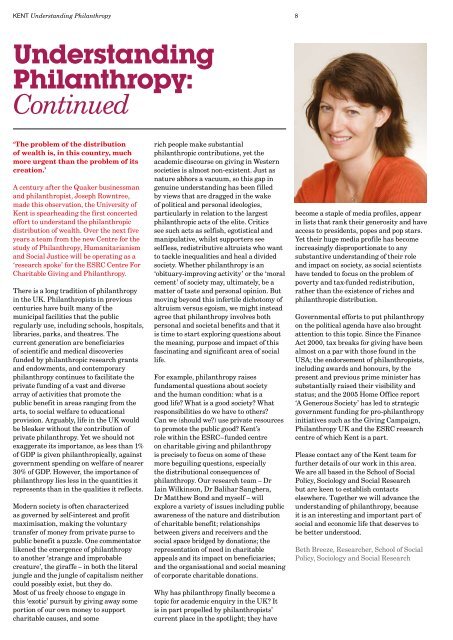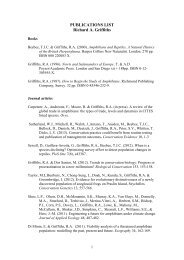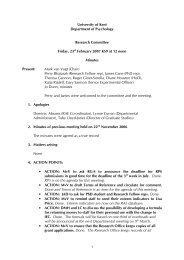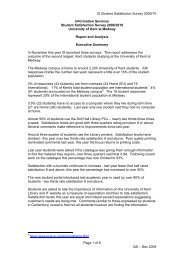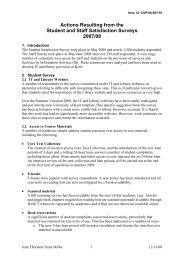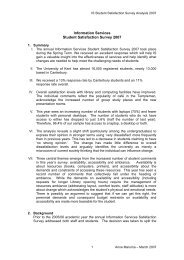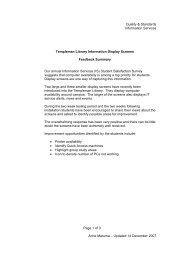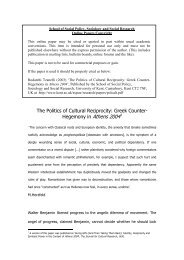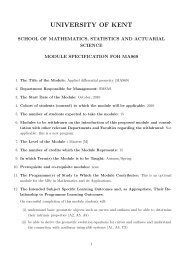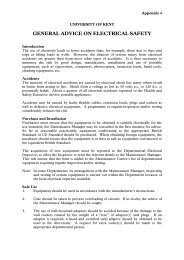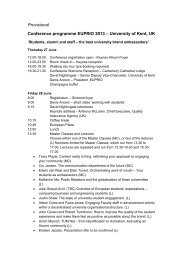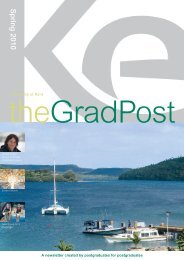The Magazine for the University of Kent
The Magazine for the University of Kent
The Magazine for the University of Kent
Create successful ePaper yourself
Turn your PDF publications into a flip-book with our unique Google optimized e-Paper software.
KENT Understanding Philanthropy<br />
8<br />
Understanding<br />
Philanthropy:<br />
Continued<br />
‘<strong>The</strong> problem <strong>of</strong> <strong>the</strong> distribution<br />
<strong>of</strong> wealth is, in this country, much<br />
more urgent than <strong>the</strong> problem <strong>of</strong> its<br />
creation.’<br />
A century after <strong>the</strong> Quaker businessman<br />
and philanthropist, Joseph Rowntree,<br />
made this observation, <strong>the</strong> <strong>University</strong> <strong>of</strong><br />
<strong>Kent</strong> is spearheading <strong>the</strong> first concerted<br />
ef<strong>for</strong>t to understand <strong>the</strong> philanthropic<br />
distribution <strong>of</strong> wealth. Over <strong>the</strong> next five<br />
years a team from <strong>the</strong> new Centre <strong>for</strong> <strong>the</strong><br />
study <strong>of</strong> Philanthropy, Humanitarianism<br />
and Social Justice will be operating as a<br />
‘research spoke’ <strong>for</strong> <strong>the</strong> ESRC Centre For<br />
Charitable Giving and Philanthropy.<br />
<strong>The</strong>re is a long tradition <strong>of</strong> philanthropy<br />
in <strong>the</strong> UK. Philanthropists in previous<br />
centuries have built many <strong>of</strong> <strong>the</strong><br />
municipal facilities that <strong>the</strong> public<br />
regularly use, including schools, hospitals,<br />
libraries, parks, and <strong>the</strong>atres. <strong>The</strong><br />
current generation are beneficiaries<br />
<strong>of</strong> scientific and medical discoveries<br />
funded by philanthropic research grants<br />
and endowments, and contemporary<br />
philanthropy continues to facilitate <strong>the</strong><br />
private funding <strong>of</strong> a vast and diverse<br />
array <strong>of</strong> activities that promote <strong>the</strong><br />
public benefit in areas ranging from <strong>the</strong><br />
arts, to social welfare to educational<br />
provision. Arguably, life in <strong>the</strong> UK would<br />
be bleaker without <strong>the</strong> contribution <strong>of</strong><br />
private philanthropy. Yet we should not<br />
exaggerate its importance, as less than 1%<br />
<strong>of</strong> GDP is given philanthropically, against<br />
government spending on welfare <strong>of</strong> nearer<br />
30% <strong>of</strong> GDP. However, <strong>the</strong> importance <strong>of</strong><br />
philanthropy lies less in <strong>the</strong> quantities it<br />
represents than in <strong>the</strong> qualities it reflects.<br />
Modern society is <strong>of</strong>ten characterized<br />
as governed by self-interest and pr<strong>of</strong>it<br />
maximisation, making <strong>the</strong> voluntary<br />
transfer <strong>of</strong> money from private purse to<br />
public benefit a puzzle. One commentator<br />
likened <strong>the</strong> emergence <strong>of</strong> philanthropy<br />
to ano<strong>the</strong>r ‘strange and improbable<br />
creature’, <strong>the</strong> giraffe – in both <strong>the</strong> literal<br />
jungle and <strong>the</strong> jungle <strong>of</strong> capitalism nei<strong>the</strong>r<br />
could possibly exist, but <strong>the</strong>y do.<br />
Most <strong>of</strong> us freely choose to engage in<br />
this ‘exotic’ pursuit by giving away some<br />
portion <strong>of</strong> our own money to support<br />
charitable causes, and some<br />
rich people make substantial<br />
philanthropic contributions, yet <strong>the</strong><br />
academic discourse on giving in Western<br />
societies is almost non-existent. Just as<br />
nature abhors a vacuum, so this gap in<br />
genuine understanding has been filled<br />
by views that are dragged in <strong>the</strong> wake<br />
<strong>of</strong> political and personal ideologies,<br />
particularly in relation to <strong>the</strong> largest<br />
philanthropic acts <strong>of</strong> <strong>the</strong> elite. Critics<br />
see such acts as selfish, egotistical and<br />
manipulative, whilst supporters see<br />
selfless, redistributive altruists who want<br />
to tackle inequalities and heal a divided<br />
society. Whe<strong>the</strong>r philanthropy is an<br />
‘obituary-improving activity’ or <strong>the</strong> ‘moral<br />
cement’ <strong>of</strong> society may, ultimately, be a<br />
matter <strong>of</strong> taste and personal opinion. But<br />
moving beyond this infertile dichotomy <strong>of</strong><br />
altruism versus egoism, we might instead<br />
agree that philanthropy involves both<br />
personal and societal benefits and that it<br />
is time to start exploring questions about<br />
<strong>the</strong> meaning, purpose and impact <strong>of</strong> this<br />
fascinating and significant area <strong>of</strong> social<br />
life.<br />
For example, philanthropy raises<br />
fundamental questions about society<br />
and <strong>the</strong> human condition: what is a<br />
good life? What is a good society? What<br />
responsibilities do we have to o<strong>the</strong>rs?<br />
Can we (should we?) use private resources<br />
to promote <strong>the</strong> public good? <strong>Kent</strong>’s<br />
role within <strong>the</strong> ESRC–funded centre<br />
on charitable giving and philanthropy<br />
is precisely to focus on some <strong>of</strong> <strong>the</strong>se<br />
more beguiling questions, especially<br />
<strong>the</strong> distributional consequences <strong>of</strong><br />
philanthropy. Our research team – Dr<br />
Iain Wilkinson, Dr Balihar Sanghera,<br />
Dr Mat<strong>the</strong>w Bond and myself – will<br />
explore a variety <strong>of</strong> issues including public<br />
awareness <strong>of</strong> <strong>the</strong> nature and distribution<br />
<strong>of</strong> charitable benefit; relationships<br />
between givers and receivers and <strong>the</strong><br />
social space bridged by donations; <strong>the</strong><br />
representation <strong>of</strong> need in charitable<br />
appeals and its impact on beneficiaries;<br />
and <strong>the</strong> organisational and social meaning<br />
<strong>of</strong> corporate charitable donations.<br />
Why has philanthropy finally become a<br />
topic <strong>for</strong> academic enquiry in <strong>the</strong> UK? It<br />
is in part propelled by philanthropists’<br />
current place in <strong>the</strong> spotlight; <strong>the</strong>y have<br />
become a staple <strong>of</strong> media pr<strong>of</strong>iles, appear<br />
in lists that rank <strong>the</strong>ir generosity and have<br />
access to presidents, popes and pop stars.<br />
Yet <strong>the</strong>ir huge media pr<strong>of</strong>ile has become<br />
increasingly disproportionate to any<br />
substantive understanding <strong>of</strong> <strong>the</strong>ir role<br />
and impact on society, as social scientists<br />
have tended to focus on <strong>the</strong> problem <strong>of</strong><br />
poverty and tax-funded redistribution,<br />
ra<strong>the</strong>r than <strong>the</strong> existence <strong>of</strong> riches and<br />
philanthropic distribution.<br />
Governmental ef<strong>for</strong>ts to put philanthropy<br />
on <strong>the</strong> political agenda have also brought<br />
attention to this topic. Since <strong>the</strong> Finance<br />
Act 2000, tax breaks <strong>for</strong> giving have been<br />
almost on a par with those found in <strong>the</strong><br />
USA; <strong>the</strong> endorsement <strong>of</strong> philanthropists,<br />
including awards and honours, by <strong>the</strong><br />
present and previous prime minister has<br />
substantially raised <strong>the</strong>ir visibility and<br />
status; and <strong>the</strong> 2005 Home Office report<br />
‘A Generous Society’ has led to strategic<br />
government funding <strong>for</strong> pro-philanthropy<br />
initiatives such as <strong>the</strong> Giving Campaign,<br />
Philanthropy UK and <strong>the</strong> ESRC research<br />
centre <strong>of</strong> which <strong>Kent</strong> is a part.<br />
Please contact any <strong>of</strong> <strong>the</strong> <strong>Kent</strong> team <strong>for</strong><br />
fur<strong>the</strong>r details <strong>of</strong> our work in this area.<br />
We are all based in <strong>the</strong> School <strong>of</strong> Social<br />
Policy, Sociology and Social Research<br />
but are keen to establish contacts<br />
elsewhere. Toge<strong>the</strong>r we will advance <strong>the</strong><br />
understanding <strong>of</strong> philanthropy, because<br />
it is an interesting and important part <strong>of</strong><br />
social and economic life that deserves to<br />
be better understood.<br />
Beth Breeze, Researcher, School <strong>of</strong> Social<br />
Policy, Sociology and Social Research


